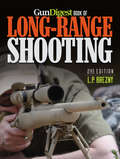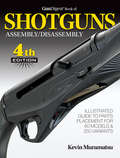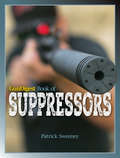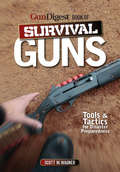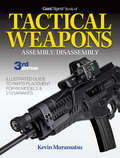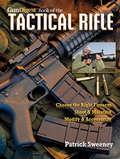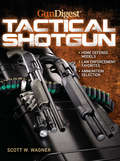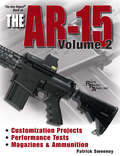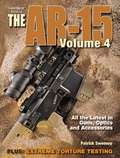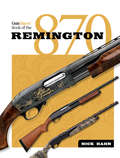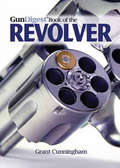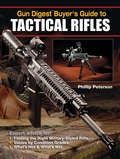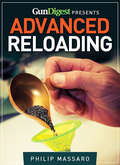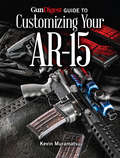- Table View
- List View
Gun Digest Book of Hunting Revolvers
by Max PrasacYour guide to big-bore revolver hunting! Handgun hunting has evolved significantly over the last 25 years. With Gun Digest Book of Hunting Revolvers, you'll learn about the available factory and custom revolvers, plus calibers, bullets, and terminal effectiveness on all sizes of game. This book stands alone as the most comprehensive look ever at the revolver as a viable primary hunting tool--and is your guide to taking the hunt to the next level like only big-bore revolver hunting can. Examine the currently available hunting revolvers and their intended applications. Read fascinating handgun hunting stories that will keep you on the edge of your seat--and inform your choice of big-bore revolvers for any game on this planet. This comprehensive examination of handgun hunting dispels the myths of handgun potency and terminal ballistics and is the ultimate guide to the challenge and reward of pursuing game with big-bore revolvers. Includes:Extensive, detailed look at factory and custom revolversTerminal ballistics: theory, application and bullet designDissolving myths about paper ballisticsPhotos and stories of big-bore revolvers on the huntWhether a seasoned sixgun shooter looking to push the limits, or a newbie just considering the close-range challenge of handgun hunting, this book is the ultimate guide.
Gun Digest Book of Long-Range Shooting
by L. P. BreznyThe long-range game has changed! It's been seven years since ballistics expert L.P. Brezny wrote the first edition of Gun Digest Book of Long-Range Shooting. Much has changed in the distance game in that time, and Brezny covers it all in this completely updated 2nd Edition. Inside you'll find: Best new guns going long New calibers and loadings Big-bore heavy-hitters for 1,000 yards and beyond The lowdown on Rifle Golf, the hottest new long-range game The hottest optics, props, chronographs, and techniques With hundreds of fresh photos and page after page of exciting new information on guns, optics, and ammunition, plus a special chapter dedicated to long-range experts in uniform, Brezny's 40-plus years behind the gun and on the bench come to life. You'll see just how far the sport of long-range shooting has come. If you've been stuck in the rut of the 100-yard rifle range and are yearning for something more challenging, this is the book you must read first.
Gun Digest Book of Pistols Assembly/Disassembly (4th Edition)
by Kevin MuramatsuCleaning, Repairing and Maintaining Pistols Has Never Been Easier! Gun Digest Book of Automatic Pistols Assembly/Disassembly, 4th Edition is the indispensable guide to DIY disassembly, repair, and reassembly of semi-automatic pistols of all types. Step-by-step disassembly and reassembly instructions for over90 models and over300 closely-related variants, including the addition of newer pistols from: Beretta Kel-Tec Ruger Sig Sauer Smith & Wesson Taurus And More! Detailed photographs and clear, simple text make it easy to disassemble and reassemble a wide range of modern and vintage models. Gun Digest Book of Automatic Pistols Assembly/Disassembly, 4th Edition is your go-to source for time- and money-saving techniques for today's hottest semi-automatic pistols.
Gun Digest Book of Revolvers Assembly/Disassembly
by J. B. WoodNOW INCLUDES DERRINGERS! Illustrated step-by-step disassembly of more than 60 models, popular and obscure Hundreds of detailed photos Reassembly tips Nobody knows guns inside and out like J. B. Wood! In this indispensable volume, J. B. provides detailed instructions on how to disassemble and reassemble more than 60 revolvers and - in a first for this series - derringers. For the gunsmith, for do-it-yourselfer or the recreational shooter, it's a must-have volume.
Gun Digest Book of SIG-Sauer
by Massad AyoobIn Gun Digest Book of SIG-Sauer 2nd Edition, pre-eminent fighting handgun trainer Massad Ayoob takes an in-depth look at some of the finest pistols on the market. In this revised 2nd Edition: First-hand gun reviews evaluate handling characteristics, design and performance Insider reviews explain developments over the past 10 years New chapters cover the most popular new models, and revisions explain significant changes to existing models If you own a SIG-Sauer pistol, have considered buying one or just appreciate the quality of these fine pistols, this is the book for you!
Gun Digest Book of Semi-Auto Pistols
by Dan ShidelerNo semi-auto shooter should be without the essential tips, techniques and advice features in this book! On of the newest members of the Gun Digest family of authoritative reference books, The Gun Digest Book of Semi-Auto Pistols contains information and entertaining articles by some of the nation's premiere semi-auto experts, including Dave Workman, Chris Christian, and Kevin Michalowski. From target models to personal protection guns, from rimfires to large-bore centerfires, The Gun Digest Book of Semi-Auto Pistols contains everything the informed shooter should know when contemplating a purchase: current offerings, chamberings, retail pricing and used-gun values. Also included: A comprehensive manufacturer and resource directory Informative articles with advice from the nation's top semi-auto experts Comprehensive catalog section features currently available semi-auto pistols and accessories An exhaustive manufacturer and resource directory
Gun Digest Book of Shotguns Assembly/Disassembly
by Kevin MuramatsuStep-by-Step Guide to Parts Placement for Today's Most Popular Shotguns! Shooters, gunsmiths and collectors alike will find the revised version of this handy guide an essential reference for disassembling and reassembling a variety of shotguns. Step-by-step photographs and clear, simple text make it easy to disassemble and reassemble a wide range of modern and vintage models. Plus, author Kevin Muramatsu's decades of gunsmithing experience shine through in practical reassembly tips that help you overcome specific reassembly hurdles for each model. Additions to the lineup include the hottest models from:BenelliBerettaChiappaCZMossbergStoegerWeatherbyAnd more!With more than a dozen of the newest, hottest shotguns on the market, this comprehensive resource now covers more than 250 variants!
Gun Digest Book of Suppressors
by Patrick SweeneySkip the Hype - Get the Facts!Suppressors are the hottest new gear on many gun ranges. Why? And how can you safely, lawfully and knowledgeably join your gun club cohorts in owning and enjoying this new shooting accessory? The next time you go to the gun club, if there isn't a suppressor present, there will be talk of them. Get the facts from an industry expert, with Gun Digest Book of Suppressors.In this first and only reference guide to suppressors, author Patrick Sweeney reports results after field-testing of dozens of suppressors and offers:Extensive coverage of available options and pricesExpert advice to select, mount, use and maintain suppressors on handguns, rifles and shotgunsWith more than 300 images and illustrations, Gun Digest Book of Suppressors covers:The basics - the history, function and use of suppressorsTesting and descriptions of dozens of models - from small to large, plain to exoticAnd finally, for the hard-core enthusiast, Sweeney gets technical and wraps up with the legalities and a few mistakes to avoid.So skip the hype and get the facts, in Gun Digest Book of Suppressors.
Gun Digest Book of Survival Guns
by Scott W. WagnerIs your gun a SURVIVAL GUN? Getting through an emergency--whether fire or flood, economic collapse or mass civil rioting and every disaster small and large in between--can depend largely on the firearms you have on hand. Now, the Gun Digest Book of Survival Guns has the lowdown on what to have with you when it's all going down. Inside you'll find pertinent information on: Firearms and ammo selection--thinking beyond what's on hand. Layered defense strategies. Methods of carry and deployment. Crucial accessories--and those to leave behind. Defense while "bugging out" and traveling. And more! Law enforcement veteran Scott Wagner absolutely delivers with this volume. With the wisdom the comes from decades of serving with a badge and an insightful and logical look at what the future can hold for all of us, Wagner answers every "What if?" you have and many more you didn't.
Gun Digest Book of Tactical Weapons Assembly/Disassembly
by Kevin MuramatsuIn this expanded edition of Gun Digest Book of Tactical Weapons Assembly/Disassembly 3rd Edition, shooters, gunsmiths and collectors alike will find an essential reference for disassembling and reassembling today's most popular tactical handguns, shotguns and rifles--including the hottest new crop of suppressor-ready models--for routine maintenance and cleaning. Step-by-step photographs and clear, simple text make it easy to disassemble and reassemble a wide range of models. Plus, author Kevin Muramatsu's decades of gunsmithing experience shine through in practical reassembly tips that help overcome specific reassembly hurdles for each model. Additions to the lineup include: HandgunsCZ 75 SP-01 TacticalCZ 805 Bren S1CZ P-07 TacticalCZ Scorpion Evo 3 S1Smith & Wesson M&P9 Pro C.O.R.E.Springfield XD(M)ShotgunsBeretta 1201 FPBeretta 1301 TacticalRiflesBeretta ARX 100CZ 750 SniperCzech VZ 2008Kriss VectorMasterpiece Arms Bolt ActionMossberg MVP LR-TSavage 110 BASIG SAUER MCXSteyr SSG-04Tikka T3x CTRWeatherby Vanguard TacticalWith the addition of 128 pages and 19 of the hottest tactical pistols, shotguns and rifles on the market, this 560-page information-packed volume now covers 66 models and more than 200 variants!
Gun Digest Book of The Tactical Rifle
by Patrick SweeneyThe Master Blaster is back in the Gun Digest Book of the Tactical Rifle! Ever feel like burning up some ammo? Well, so does Pat Sweeney! In the Gun Digest Book of the Tactical Rifle, America¹s favorite black rifle expert puts today's hottest tactical rifles through their paces. It's a fun and fact-filled exploration of high-volume shooting at its finest. From AKs to M14s, from AUGs to SCARS, Pat gives practical, real-world advice on tactical rifles from around the world. It's a great go-to book for shooters, collectors and hobbyists in fact, for anyone with an interest in tactical rifles and their uses. It pays to try before you buy! So let Pat Sweeney try them out for you in Gun Digest Book of the Tactical Rifle! About the Author Patrick Sweeney is a renowned competition shooter, master gunsmith, film consultant and certified Armorer Instructor for police departments nationwide. His best-selling titles include: The Gun Digest Book of the 1911 Vol. 1 & 2, The Gun Digest Book of the Glock Vol. 1 & 2, The Gun Digest Book of the AR-15 Vol. 1, 2 & 3, Gunsmithing: Rifles, Gunsmithing: Pistols & Revolvers and 1911: The First 100 Years, among others.
Gun Digest Book of The Tactical Shotgun
by Scott W. WagnerYour one-stop guide to tactical shotguns: Selection. Modifications. Accessories. Tactical Shotgun is the essential guide to selecting and using a shotgun for defense. Whether your concern is self-defense, home defense or law enforcement, author Scott Wagner's advice will help you make informed decisions. Here he offers an experienced point of view on many makes and models of tactical shotguns, along with information on ammunition and the many accessories available. Find out: What is a "tactical" shotgun? Pump action, semi-auto or double? What's the best choice for home defense? Which features are valued by law enforcement? Wagner also reviews some fun specialty ammo (learn which exotic load promised quite a show, but ultimately fizzled), and performs some very revealing backyard ballistics testing.
Gun Digest Book of the AK & SKS, Volume II: Complete Guide to Guns, Gear and Ammunition
by Patrick Sweeney"Things that are complex are not useful. Things that are useful are simple." --Mikhail Kalashnikov In Gun Digest Book of the AK & SKS, Volume 2, Patrick Sweeney picks up where Volume 1 left off and brings Kalashnikov's timeless firearm designs--the AK-47 and AK-74--plus their predecessor, Simonov's SKS, full circle into the modern era. In exhaustive detail and told in his own entertaining way, comrade Sweeney provides not only the historical perspective on these now-ubiquitous Russian guns, but also how to modernize and upgrade them for today's American-style tactical shooting. You'll learn how to order and build an AK from a parts kit, the differences between stamped- and milled-receiver AKs, and all about caliber choices, ammo considerations, AKs by country, legalities, magazines, stocks, handguards, accessories and optics. Sweeney blasts through the white noise, helping you choose the perfect new AK for your needs. Plus how to service and maintain the AK, disassemble, reassemble, repair, inspect and collect used AKs and SKSs. Processes for AK accuracy testing are taught, plus gun reviews of today's hottest models, including the Century Arms C39V2, Krebs Custom K-AC15 Mod 2 Long UFM and IWI ACE. You'll get:AK-47, AK-74 and SKS parts and functions, basic to advancedAmmunition and aftermarket accessory tipsHow to disassemble, maintain, customize and reassembleAccuracy testing and optics choices for the most recalcitrant AK!
Gun Digest Book of the AR-15 Volume II
by Patrick SweeneyEven more about America's favorite rifle! More models! More photos! More accessories! Field-proven and battle-hardened by two generations of warriors, the AR-15 is one of today's hottest law enforcement and anti-terrorism tools. In The Gun Digest Book of the AR-15, Volume II, master gunsmith/firearms instructor Patrick Sweeney offers even more tips, tricks and techniques about America's favorite "black rifle," the legendary AR-15. From the newest 6.8 mm loads to the latest gee-whiz accessories, if it has to do with the AR-15, it's in this book! You'll find:Ammunition Magazines Barrels Stocks Forearms Scopes Bolts Slings Lowers Flash Hiders, Comps & Brakes Shooting Tests ...and more! Whether you are a recreational shooter, law enforcement professional, or collector-The Gun Digest Book of the AR-15, Volume II is the invaluable guide you need to the ever-changing world of the ageless AR-15.
Gun Digest Book of the AR-15, Volume IV
by Patrick SweeneyYou wouldn't do this to your AR, but Sweeney did it here! With manufacturers branching out into nontraditional calibers, and continual advances in optics, ammo and associated gear for the AR-15, Gun Digest Book of The AR-15, Volume IV brings you up-to-date on the latest developments in the AR industry, including chapters on: .223 vs. 5.56: What's the problem? Various .300s of the smaller-than-.308 size Wilson 7.62X40 The .17 HMR, ADCOR DI carbine, and SIG 516 DelTon and Stag Arms? Oh yes. Plus, author Patrick Sweeney hits the range and subjects these guns to some serious testing. To find out just how much abuse they can withstand, he: Buried them in dirt and sand Submerged them in water Dropped them from heights Ran them over with trucks Froze them Blasted them with a shotgun And then he fired them, documenting the entire process in photos! Kick back and watch in horror as events unfold-and find out which guns survive the torture.
Gun Digest Book of the Remington 870
by Nick HahnWhile more than a few gun makers over the centuries have sold guns in numbers that meet the million mark, it's rare to do so with just a single model. But Remington did it, and they did it with a gun that defines simplicity, reliability, and dependability: the Model 870 shotgun. Now, Gun Digest, in collaboration with noted shotgun author and expert Nick Hahn, brings you a celebration of that one fantastic gun in Gun Digest Book of the Remington 870.
Gun Digest Buyer's Guide To Assault Weapons
by Phillip PetersonThis collector's guide to highly collectible group known as the assault weapons gives an overview of different types of assault firearms, explains relative scarcity, outlines profit potential and manufacturer differences, lists gun values, and includes expert buyer tips.
Gun Digest Buyer's Guide to Tactical Rifles
by Phillip PetersonBuying? Selling? Arm Yourself with the Facts–with Gun Digest® Buyer's Guide to Tactical Rifles!A seller's market can turn into a buyer's market overnight–especially the red-hot tactical rifle market! But how do you know what a particular gun is worth? Simple! Just check the Gun Digest® Buyer's Guide to Tactical Rifles!It's all here! From ARs to AKs, from Scorpions to Tommyguns, author Phillip Peterson gives you the straight scoop on everything that can even remotely be considered a tactical rifle. And Peterson, stickler that he is, has even included tactical handguns and carbines. If it's tactical or paramilitary in nature, you'll find it here!SpecificationsCurrent ValuesHundreds of IllustrationsHistoriesAnd Much More!Don't pay too much! Don't sell for too little! KNOW what your guns are worth–with the Gun Digest® Buyer's Guide to Tactical Rifles!
Gun Digest Greats on Handguns
by Gun Digest EditorsExcerpt from Chapter 1:The first revolver was patented by Samuel Colt in 1836. Since then there have been no less than 156 manufacturers of revolving handguns. The Army and Navy, since that time, have adopted 44 different revolvers and 9 different pistols, made by 32 separate manufacturers, ranging in caliber from 32 to 58. The earliest model was accepted in 1842, the last in 1911. While Colt invented the first firearm which successfully employed a cylinder containing separate charges of powder and ball, it remained for another soon-to-grow-famous New Englander, Douglas Wesson, to adapt his newly perfected 22 rim fire cartridge to an equally successful and new revolver. His revolver, puny and low powered, was quite popular with Union officers during the War between the States. This revolver, a seven-shot breech loader, was the Model of 1855.
Gun Digest Guide To Concealed Carry Handguns
by Dick JonesAre you interested in carrying a handgun for self defense, but don't know where to start? Perhaps you're already an armed citizen and are looking for a new carry choice? Let the Gun Digest Guide to Concealed Carry Firearms be your complete guide to the fast-growing world of concealed carry handguns.Author and certified firearms instructor Dick Jones answers your questions:Revolver versus semi-autoFull-size or compactBest calibersHolster and sight optionsTraining tipsIssues specific to womenThe book also includes the most comprehensive and up-to-date buyer's guide to concealed carry handguns available anywhere:Hundreds of full-color photosTechnical specifications for almost every concealed carry handgun on the market todayIn-depth reviews and shooting tests of some of the most popular modelsWith practical, real-world advice and insight from an author with decades of experience, Gun Digest Guide to Concealed Carry Firearms can help you make the best possible choice for a concealed carry handgun.
Gun Digest Guide to Advanced Reloading
by Philip MassaroFrom Chapter One:Hello again folks, Mr. Massaro here, welcoming you to the second reloading ammo blog series. We will get a bit more in depth this time, so grab a comfy chair and let's chat.Shoulder bump, eh? Nah, I'm not talking about some hipster dance, I'm talking about how much we move the cartridge shoulder during the resizing process.Most folks (myself included) will resize a bottleneck rifle case so that it adheres to the specified SAAMI specifications, but that requires working the brass considerably. As we've all seen, overworking the brass will make it brittle, and cut the life of our brass much shorter than necessary.
Gun Digest Guide to Customizing Your AR-15
by Kevin MuramatsuWhether for practical application or tricking out your gun, today's AR accessories are a world unto themselves. Gun Digest Guide to Customizing Your AR-15 examines the dizzying array of options and makes recommendations for today's growing crowd of AR owners.Exhaustive insights into a broad spectrum of parts, accessories, and brandsFrom stocks to suppressors, and everything in betweenBonus coverage of "other" black guns: FAL and AKSpecial Section: Full-color photo gallery of custom AR creations!Whether you're in the planning stages or putting the finishing touches on your custom AR-15, this comprehensive guide helps you understand your options for nearly every conceivable variation.
Gun Digest Guide to Maintaining & Accessorizing Firearms
by Kevin MuramatsuIn Gun Digest Guide to Maintaining & Accessorizing Firearms, gunsmith Kevin Muramatsu answers the most common questions he gets from gun owners about caring for and upgrading their firearms:How much more stuff do I have to buy to maintain and clean my new firearm?How do I make it more personalized to me, or more effective as a tool?What if something breaks?With an enteraining and user-friendly DIY format, this book provides the basic steps that every gun owner needs to know to correctly clean, maintain, and accessorize firearms without damaging them.
Gun Digest Guide to Modern Shotgunning
by L. P. BreznyWhat's new in shotgunning? Everything! Authored by noted shotgun and ballistics expert L.P. Brezny, Gun Digest Guide to Modern Shotgunning is the definitive volume on getting the most out of today's wide array of premium shotguns and ammunition. This is truly a must-have volume for practiced wingshooters looking to maximize their ammunition, their shotgun, and their shooting performance. How advances in non-toxic shells are changing shotgunning Shot string performance from muzzle to target Guns and chokes making the grade 10-gauge vs. 12-gauge--the battle decided! Easy-to-understand ballistics tables And much, much more!

